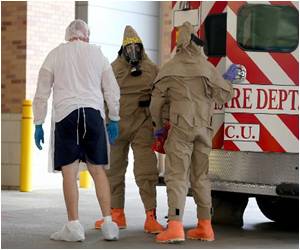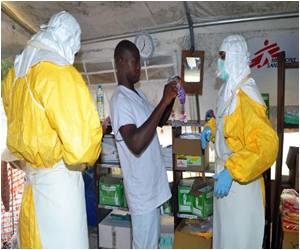A chaste new set of social norms are being followed by people of Ebola-hit Sierra Leone, where touching and kissing are a definite no-no .

The closures of schools, stadiums and entertainment venues coupled with a ban on public gatherings have left young people idle and disaffected, and their parents worried.
The ABC of Ebola -- "Avoid Body Contact" -- is now deeply ingrained, with people renouncing handshakes and hugs, but the rule stops at the bedroom door.
Maternity wards in Freetown have been deserted by women who fear being infected by Ebola, yet nurses report seeing an increase in pregnant teenage girls, some aged as young as 13.
"If you were expecting a decline in the birth rate, it is quite the opposite," says Musab Sillah, director of the Kuntorloh clinic in the capital Freetown.
"Everyone recommends avoiding contact but at the same time schools are closed and there is no more social activity. The girls stay at home and meet the boys," he said.
Advertisement
- Transactional sex -
Advertisement
"We have no evidence or currently no way to conduct a statistical study due to Ebola, but we can expect a large increase in teenage pregnancies," said Matthew Dalling, UNICEF's head of child protection in Sierra Leone.
"This is a logical assumption, as 2.8 million young people are out of school," he added, noting that even before Ebola, 38 percent of girls were getting pregnant before 18 and half were married before 15.
Sierra Leone languishes in 183rd place on the UN's human development index of 187 countries and is also near the bottom in terms of GDP per capita.
Hunger has given rise to what Dalling calls "transactional sex" among young people -- not quite prostitution "but a relationship in exchange for a favour, a mobile phone, bread, some food".
"We know there was a problem before. It's hard to estimate how much it has increased, but combined with the levels of vulnerability, the lack of schools, the impossibility of going anywhere, it makes sense that it must be growing," he said.
Sierra Leone, like its neighbour Liberia, is struggling to recover barely a decade after the end of a brutal civil war.
- Sex attacks -
The conflict left the world with images of child soldiers and rebels funded by "blood diamonds" hacking off limbs, and by 2002 some 50,000 people had died.
The teenagers coping with Ebola were born during the 11-year conflict, in many cases to parents who were themselves in their young teens.
The epidemic, with its accompanying military roadblocks, curfews and all-pervading fear of other people, has opened old wounds.
"Sierra Leone is experiencing a collective trauma with Ebola. That is a big stress on people and people are in pain and getting frustrated and angry," Dalling said.
"We are expecting to see a surge of gender-based violence and exploitation and abuse in the coming months."
Rights group Humanist Watch Salone said it has seen a spike in sexual and gender-based violence in eastern Sierra Leone, the area hit hardest as the epidemic began to spiral out of control in July and August.
The head of the agency, Christopher Braima, told a recent news conference his staff had recorded 33 cases of sex attacks, mostly on girls aged under 14, in the last four months, according to local media.
Meanwhile, parents agonise over how much freedom to give their children and whether they are safe -- parents like Michael, a driver in Freetown who has blown his savings on an expensive television for his 13-year-old daughter.
"I'm afraid she's going to get herself into trouble. I'd prefer that she stays at home and watches films," he said.
Source-AFP















